德国文化类型分析英文
- 格式:pptx
- 大小:878.14 KB
- 文档页数:2
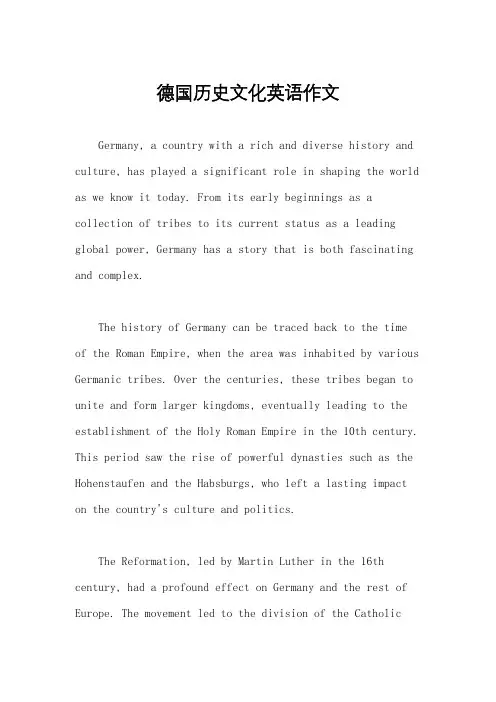
德国历史文化英语作文Germany, a country with a rich and diverse history and culture, has played a significant role in shaping the world as we know it today. From its early beginnings as a collection of tribes to its current status as a leading global power, Germany has a story that is both fascinating and complex.The history of Germany can be traced back to the time of the Roman Empire, when the area was inhabited by various Germanic tribes. Over the centuries, these tribes began to unite and form larger kingdoms, eventually leading to the establishment of the Holy Roman Empire in the 10th century. This period saw the rise of powerful dynasties such as the Hohenstaufen and the Habsburgs, who left a lasting impact on the country's culture and politics.The Reformation, led by Martin Luther in the 16th century, had a profound effect on Germany and the rest of Europe. The movement led to the division of the CatholicChurch and the emergence of Protestantism, which had a lasting impact on the religious and cultural landscape of the country. The Thirty Years' War, which followed the Reformation, devastated much of Germany and led to widespread suffering and hardship for its people.The 18th and 19th centuries saw the rise of Prussia as a dominant force in German politics, leading to the unification of Germany under the leadership of Otto von Bismarck. This period also saw the emergence of German classical music, with composers such as Beethoven, Bach, and Mozart leaving a lasting legacy that still influences music today.The 20th century was a tumultuous time for Germany, marked by two devastating world wars and the rise and fall of the Nazi regime. The aftermath of World War II saw Germany divided into East and West, with the Berlin Wall becoming a symbol of the Cold War. The reunification of Germany in 1990 marked a new chapter in the country's history, leading to a period of rapid economic and cultural growth.Today, Germany is known for its rich and vibrant culture, with a thriving arts scene, world-class museums, and a strong tradition of literature and philosophy. The country's contributions to science and technology are also widely recognized, with German innovations in fields such as engineering, medicine, and renewable energy leading the way for the rest of the world.In conclusion, Germany's history and culture are a testament to the resilience and creativity of its people. From the early days of the Holy Roman Empire to the reunification of the country in the 20th century, Germany has overcome numerous challenges and emerged as a global leader in politics, economics, and culture. Its impact on the world is undeniable, and its legacy will continue to shape the future for generations to come.。
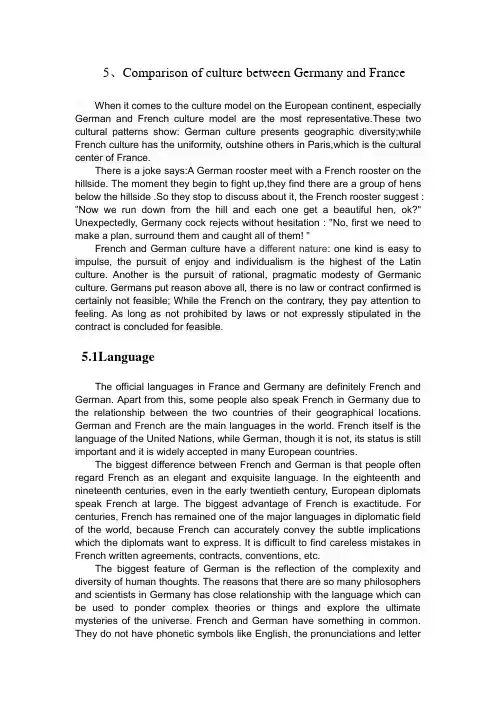
5、Comparison of culture between Germany and FranceWhen it comes to the culture model on the European continent, especially German and French culture model are the most representative.These two cultural patterns show: German culture presents geographic diversity;while French culture has the uniformity, outshine others in Paris,which is the cultural center of France.There is a joke says:A German rooster meet with a French rooster on the hillside. The moment they begin to fight up,they find there are a group of hens below the hillside .So they stop to discuss about it, the French rooster suggest : "Now we run down from the hill and each one get a beautiful hen, ok?" Unexpectedly, Germany cock rejects without hesitation : "No, first we need to make a plan, surround them and caught all of them! "French and German culture have a different nature: one kind is easy to impulse, the pursuit of enjoy and individualism is the highest of the Latin culture. Another is the pursuit of rational, pragmatic modesty of Germanic culture. Germans put reason above all, there is no law or contract confirmed is certainly not feasible; While the French on the contrary, they pay attention to feeling. As long as not prohibited by laws or not expressly stipulated in the contract is concluded for feasible.5.1LanguageThe official languages in France and Germany are definitely French and German. Apart from this, some people also speak French in Germany due to the relationship between the two countries of their geographical locations. German and French are the main languages in the world. French itself is the language of the United Nations, while German, though it is not, its status is still important and it is widely accepted in many European countries.The biggest difference between French and German is that people often regard French as an elegant and exquisite language. In the eighteenth and nineteenth centuries, even in the early twentieth century, European diplomats speak French at large. The biggest advantage of French is exactitude. For centuries, French has remained one of the major languages in diplomatic field of the world, because French can accurately convey the subtle implications which the diplomats want to express. It is difficult to find careless mistakes in French written agreements, contracts, conventions, etc.The biggest feature of German is the reflection of the complexity and diversity of human thoughts. The reasons that there are so many philosophers and scientists in Germany has close relationship with the language which can be used to ponder complex theories or things and explore the ultimate mysteries of the universe. French and German have something in common. They do not have phonetic symbols like English, the pronunciations and lettercombinations are regular from which you can just master the pronunciation rules, and one of the features of pronunciation in both languages is uvular. 5.2 ReligionIn recent decades,the religious situation in France to a considerable extent,become more diversified, religious activities with rigidly fixed to the form of worship is reduced,and become more secular,more personalized.French main religion is Roman Catholicism,followed by Protestant,Orthodox Christianity,Islam and Judaism. The Catholic Church is still the most French belief,65% of French people claim they are Catholic.While in Germany, the main religions are Catholicism and Protestantism.Germany has 31.75% inhabitant believe in Christianity,32.06% of the people believe in the Catholic.5.3Customs cultureGeographically,Germany and France are neighboring countries, but in the humanities customs, including diet, meeting etiquette, festival custom has its own characteristics.5.3.1FoodFrench cuisine is extremely diverse, with only the Chinese having similar variety in their food. This variety is supported by the French passion for good food in all its forms, France's extraordinary range of different geographies and climates which support the local production of all types of ingredients, and France's long and varied history. In many ways, an understanding of the culture of French food is an understanding of France itself. Meals range from the very basic, such as the traditional baguette plus cheese plus inexpensive wine, to very elaborate affairs that can involve a dozen courses and different wines consumed over several hours.It is common in much of France to take a two hour break for lunch, with many working parents (particularly in villages and smaller towns) returning home for lunch. In some areas, mainly in the south of France, even longer lunch breaks are taken. Due to the long lunch break, businesses which close for this period typically reopen around 2PM or so and then stay open until about7PM.In all parts of France one will find a range of dishes, both in restaurants and in homes, which extends far beyond the regional specialities. However, in much of France the regional influences in terms of ingredients and cooking aremarked. The most available food and the best cooking tend to be those produced from local ingredients and using local recipes.The French Mediterranean uses olive oil, herbs and tomatoes in many of its dishes. The cuisine of northwest France uses butter, soured cream (crème fraiche) and apples. The cuisine of northeast France (Alsace, and to a lesser extent Lorraine) has a strong German influence which includes beer and sauerkraut. Throughout the south in general there tends to be more use of vegetables and fruit (in part due to the favourable climate). Near the Atlantic coast and the Mediterranean there is a greater consumption of sea food, while inland areas favoured by rivers (e.g. the Loire valley) use more fresh water fish.Germany is famous for the world …s widest variety of sausages. And German beer or white wine are essential for each meal.Features of German cuisine is sweets, sour food and dairy products are more diverse and varieties of lettuce, sour cabbage braised pork knuckle, Stout Braised Beef is the German representative dishes. Germans do not pay attention to diet,they prefer fruits, cheese, sausage, sour cabbage, potato salad, etc.. They do not seek flashy, just affordable nutrition..The fast food buffet firstly invented by German.Germans are fond of drink beer, Oktoberfest annually consume about one million liters of beer.AD 1516 the Duchy of Bavaria, Grand Duke William IV issued a "pure German beer order", the provisions of German beer can only barley malt, hops and water three kinds of raw material production, so the last five hundred years to become the so-called German beer that is pure beer synonymous. Today, Germany is the world's second largest beer producer, within a total of thirteen hundred breweries, beer production up to more than five thousand kinds of species, according to official statistics, an average of every German drank 138 liters of beer per year, the World could not find a more loving than the German nation of beer! Especially in the annual Oktoberfest (Oktoberfest) period could be as high as six million liters consumed beer. For many years the formation of the German culture of beer is unique in the world.German think bread is natural food that is nutritious and conducive to a health. Bread must match with sausage .In the production of bread Germany can also be regarded as the quality and quantity of world champion. German bread is made of flour , rye, oats, flour and grains blended together to do the mixed bread. German daily baked bread have more than 1500 kinds of varieties. Bread is a German meals indispensable food. According to statistics, the average annual per capita have bread of 81.5 kg, ranking first in the EU member states.5.3.2FestivalsFrance is one of the most festivals of the world, including weekends, paid vacation, holidays plus other holidays.Around the year, French people about150 days a year don‟t need to work. French holidays include National Day, St. wax Festival, Imperial Festival 11 Festival, January 6, Catholic "Three Kings to the DPRK." In "Three Kings to the DPRK."day Frenchman eat three kings to the DPRK cake, and has a small beans on bread, symbolizing people have good luck; National Day on July 14, and during the day there are parade,and fireworks at night. Some villages will be organized torchlight procession, dancing and so on.Holy week is public holiday.Palm Sunday (the celebration of Jesus' solemn entrance into Jerusalem), Holy Thursday (the celebration of Jesus' Last Supper commemorating the institution of the Holy Eucharist and Sacrament of the Priesthood) and Good Friday (the celebration of the Passion of Christ and his death on the cross) ends with the Easter Vigil (or Paschal Vigil), between sunset on Holy Saturday and sunrise on Easter Day (Christ's victory over death). Easter Sunday is the day of Christ's Resurrection. The date changes from year to year, but always occurs between 22 March and 25 April.Commemorating the storming of the Bastille on 14th July 1789, Bastille Day takes place on the same date each year. The main event is a grand military parade along the Champs-Élysées, attended by the President of the Republic and other political leaders. It is accompanied by fireworks and publics dances in towns throughout the whole of France.As its name indicates, All Saints' Day, the first day of November, is the festival of “all the saints” honored by the Catholic Church. It is not the commemoration of the dead - that is 2 November. However, because All Saints' Day is a public holiday, families are able to go to the cemeteries and lay chrysanthemums on the graves of their nearest and dearest.German folk and religious festivals are about more than a thousand, to celebrate the range from small villages to the country, ranging from twelve days to more than two weeks. On the average three festivals one day. For decades, people are constantly on the run in order to make money, but forgotten a lot of folk festivals. 80 years later, people gradually tired of rampant materialism, the memory of humanity innocence, recover a lot of the local culture and customs of the festival. Comparison of the major festival of the German New Year, Trinity Festival, Carnival, Christmas, etc.To celebrate the New Year ,German present in the moments before the New Year's Eve midnight and climb on a chair, when the bell ring, they jump off a chair and throw some weight back to show their rejection to the scourge,jumping into the New Year.On October 3, 1990 the former Federal Republic of Germany (former West Germany) and the former German Democratic Republic (former East Germany) officially announced the unification of them. And German reunification, the symbol of the Brandenburg gate in Berlin: downtown lindens street and June 17th street, is the famous tourist attractions in Berlin, Germanyand the symbol of unity.5.3.3Meeting etiquetteIn interpersonal relationships, the French people take the meet etiquette, for example mainly handshake, hug ceremony and a gift. A kiss on the cheek not only the most frequently and widely used, but in its most specific practices also have certain characteristics. A kiss is intended to represent a cordial and friendly, they tend to be the same association objects to each other in the other one‟s cheeks alternately kissed three or four times, but we must also pay attention to beep when kissing. In fact, they do not necessarily kiss each other, just a show.Strict German also pay more attention to etiquette form. At social occasions to meet with the guests, usually shake hands. When friends 、acquaintances and relatives meet with each other,generally present hugging ceremony.Familiar friends when they meet each other often have kiss in the cheek . In the daily life, kiss on the hand has rarely happened.ReferencesChenQiang:《The decline of soft power in French culture and the reflections of French president's , scholars》,from《Economic and Social Development》,12th,2008 DengXianchao:《The cultural soft power of upgrading and revelation in Developed Countries》,from《Theoretical Exploration》,4th,2009DuMei:《The cultural history of Germany》[M].Beijing:Peking University Publication,2000。
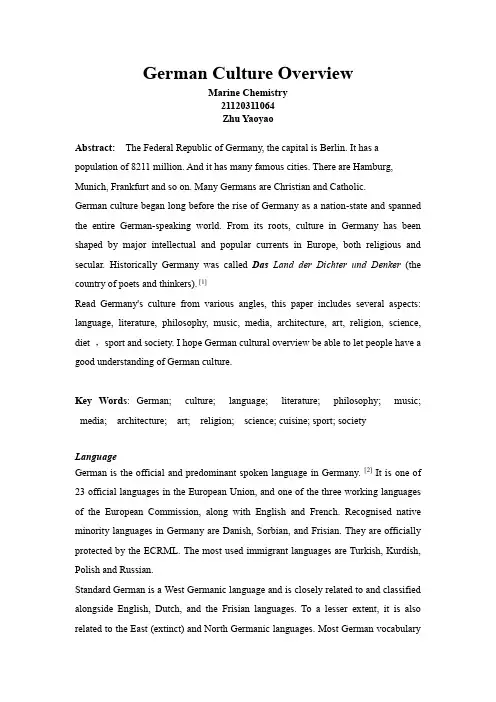
German Culture OverviewMarine Chemistry21120311064Zhu YaoyaoAbstract: The Federal Republic of Germany, the capital is Berlin. It has a population of 8211 million. And it has many famous cities. There are Hamburg, Munich, Frankfurt and so on. Many Germans are Christian and Catholic.German culture began long before the rise of Germany as a nation-state and spanned the entire German-speaking world. From its roots, culture in Germany has been shaped by major intellectual and popular currents in Europe, both religious and secular. Historically Germany was called Das Land der Dichter und Denker(the country of poets and thinkers).[1]Read Germany's culture from various angles, this paper includes several aspects: language, literature, philosophy, music, media, architecture, art, religion, science, diet ,sport and society. I hope German cultural overview be able to let people have a good understanding of German culture.Key Words: German; culture; language; literature; philosophy; music; media; architecture; art; religion; science; cuisine; sport; societyLanguageGerman is the official and predominant spoken language in Germany.[2] It is one of 23 official languages in the European Union, and one of the three working languages of the European Commission, along with English and French. Recognised native minority languages in Germany are Danish, Sorbian, and Frisian. They are officially protected by the ECRML. The most used immigrant languages are Turkish, Kurdish, Polish and Russian.Standard German is a West Germanic language and is closely related to and classified alongside English, Dutch, and the Frisian languages. To a lesser extent, it is also related to the East (extinct) and North Germanic languages. Most German vocabularyis derived from the Germanic branch of the Indo-European language family.[3] German is written using the Latin alphabet. German dialects are distinguished from varieties of standard German. German dialects are traditional local varieties and are traced back to the different German tribes.Around the world, German has approximately 100 million native speakers and also about 80 million non-native speakers.[4]German is the main language of about 90 million people (18%) in the EU. 67% of German citizens claim to be able to communicate in at least one foreign language, 27% in at least two languages other than their own.[2]LiteratureGerman literature can be traced back to the Middle Ages, with the most notable authors of the period being Walther von der V ogelweide and Wolfram von Eschenbach. The Nibelungenlied, whose author remains unknown, is also an important work of the epoch. The fairy tales collections collected and published by Jacob and Wilhelm Grimm in the 19th century became famous throughout the world.Theologian Luther, who translated the Bible into German, is widely credited for having set the basis for the modern "High German" language. Among the most admired German poets and authors are Lessing, Goethe, Schiller, Kleist, Hoffmann, Brecht, Heine and Schmidt. Nine Germans have won the Nobel Prize in literature: Theodor Mommsen, Paul von Heyse, Gerhart Hauptmann, Thomas Mann, Nelly Sachs, Hermann Hesse, Heinrich Böll, Günter Grass, and Herta Müller.PhilosophyThe rise of the modern natural sciences and the related decline of religion raised a series of questions, which recur throughout German philosophy, concerning the relationships between knowledge and faith, reason and emotion, and scientific, ethical, and artistic ways of seeing the world.German philosophers have helped shape western philosophy from as early as the Middle Ages. Later, Leibniz and most importantly Kant played central roles in the history of philosophy. Kantianism inspired the work of Schopenhauer and Nietzsche as well as German idealism defended by Fichte and Hegel. Marx and Engelsdeveloped communist theory in the second half of the 19th century while Heidegger and Gadamer pursued the tradition of German philosophy in the 20th century. A number of German intellectuals were also influential in sociology, most notably Adorno, Habermas, Horkheimer, Luhmann, Simmel, Tönnies, and Weber. The University of Berlin founded in 1810 by linguist and philosopher Wilhelm von Humboldt served as an influential model for a number of modern western universities. In the 21st century Germany has been an important country for the development of contemporary analytic philosophy in continental Europe, along with France, Austria, Switzerland and the Scandinavian countries.[5]MusicIn the field of music, Germany claims some of the most renowned classical composers of the world including Bach, Mozart and Beethoven, who marked the transition between the Classical and Romantic eras in Western classical music. Other composers of the Austro-German tradition who achieved international fame include Brahms, Wagner, Haydn, Schubert, Händel, Schumann, Liszt, Mendelssohn Bartholdy, Johann Strauss II, Bruckner, Mahler, Telemann, Richard Strauss, Schoenberg, Orff, and most recently, Henze, Lachenmann, and Stockhausen.As of 2006, Germany is the fifth largest music market in the world,[6] has exerted a strong influence on techno and rock music, and pioneered trance music. German musicians and, particularly, the pioneering bands Tangerine Dream and Kraftwerk have also contributed to the development of electronic music.[7]Germany hosts many large rock music festivals annually. The Rock am Ring festival is the largest music festival in Germany, and among the largest in the world. German artists also make up a large percentage of Industrial music acts,which is called Neue Deutsche Härte. Germany hosts some of the largest Goth scenes and festivals in the entire world, with events like Wave-Gotik-Treffen and M'era Luna Festival easily attracting up to 30000 people.MediaGermany's television market is the largest in Europe, with some 34 million TV households. The many regional and national public broadcasters are organised in linewith the federal political structure. Around 90% of German households have cable or satellite TV, and viewers can choose from a variety of free-to-view public and commercial channels. Pay-TV services have not become popular or successful while public TV broadcasters ZDF and ARD offer a range of digital-only channels.[8] Germany is home to some of the world's largest media conglomerates, including Bertelsmann, the Axel Springer AG and ProSiebenSat.1 Media.The German-speaking book publishers produce about 700 million copies of books every year, with about 80000 titles, nearly 60000 of them new publications. Germany is in third place on international statistics after the English-speaking book market and the People’s Republ ic of China.[9]The Frankfurt Book Fair is considered to be the most important book fair in the world for international deals and trading and has a tradition that spans over 500 years.ArchitectureArchitectural contributions from Germany include the Carolingian and Ottonian styles, important precursors of Romanesque. The region then produced significant works in styles such as the Gothic, Renaissance and Baroque.The nation was particularly important in the early modern movement through the DeutscherWerkbund and the Bauhaus movement identified with Walter Gropius. The Nazis closed these movements and favoured a type of neo-classicism. Since World War II, further important modern and post-modern structures have been built, particularly since the reunification of Berlin.ArtGerman art has a long and distinguished tradition in the visual arts, from the earliest known work of figurative art to its current output of contemporary art.Important German Renaissance painters include Albrecht Altdorfer, Lucas Cranach the Elder, Matthias Grünewald, Hans Holbein the Younger and the well-known Albrecht Dürer. The most important Baroque artists from Germany are Cosmas Damian Asam. Further artists are the painter Anselm Kiefer, romantic Caspar David Friedrich, the surrealist Max Ernst, the conceptualist Joseph Beuys, or Wolf V ostell or the neo-expressionist Georg Baselitz.ReligionThe German government has limited responsibilities for culture, which is devolved to the states of Germany, called Bundesländer.64.1 percent of the German population belongs to Christian denominations. 31.4 percent are Roman Catholic, and 32.7 percent are affiliated with Protestantism [10]. The North and East is predominantly Protestant, the South and West rather Catholic. Nowadays there is a non-religious majority in Hamburg and the East German states.[11] Germany formed a substantial part of the Roman Catholic Holy Roman Empire, but was also the source of Protestant reformers such as Martin Luther.Historically, Germany had a substantial Jewish population. Only a few thousand people of Jewish origin remained in Germany after the Holocaust, but the German Jewish community now has approximately 100,000 members, many from the former Soviet Union. Germany also has a substantial Muslim minority, most of whom are from Turkey.ScienceGermany has been the home of many famous inventors and engineers, such as Johannes Gutenberg, who is credited with the invention of movable type printing in Europe; Hans Geiger, the creator of the Geiger counter; and KonradZuse, who built the first computer.[12] German inventors, engineers and industrialists such as Zeppelin, Daimler, Diesel, Otto, Wankel, V on Braun and Benz helped shape modern automotive and air transportation technology including the beginnings of space travel.[13][14]The work of Albert Einstein and Max Planck was crucial to the foundation of modern physics, which Werner Heisenberg and Erwin Schrödinger developed further.[15] They were preceded by such key physicists as Hermann von Helmholtz, Joseph von Fraunhofer, and Gabriel Daniel Fahrenheit, among others. Wilhelm Conrad Röntgen discovered X-rays, an accomplishment that made him the first winner of the Nobel Prize in Physics in 1901.[16]The Walhalla temple for "laudable and distinguished Germans", features a number of scientists, and is located east of Regensburg, in Bavaria.[17][18]Germany is home to some of the finest academic centers in Europe. Some famousUniversities include those of bothMunich and Berlin, University of Tübingen, University of Göttingen, University of Marburg, University of Berlin, Mining Academy Freiberg and Freiburg University, among many others. Moreover the Ruprecht-Karls-Universität Heidelberg is one of the oldest universities in Europe. CuisineGerman cuisine varies from region to region. The southern regions of Bavaria and Swabia, for instance, share a culinary culture with Switzerland and Austria. Pork, beef, and poultry are the main varieties of meat consumed in Germany, with pork being the most popular.[19] Throughout all regions, meat is often eaten in sausage form. More than 1500 different types of sausage are produced in Germany. Organic food has gained a market share of around 3.0%, and is predicted to increase further.[20]A popular German saying has the meaning: "Breakfast like an emperor, lunch like a king, and dine like a beggar." Breakfast is usually a selection of breads and rolls with jam and honey or cold cuts and cheese, sometimes accompanied by a boiled egg. Cereals or muesli with milk or yoghurt is less common but widespread.[21] More than 300 types of bread are sold in bakery shops across the country.[22]As a country with many immigrants, Germany has adopted many international dishes into its cuisine and daily eating habits. Italian dishes like Pizza and Pasta, Turkish and Arab dishes like Döner Kebab and Falafel are well established, especially in bigger cities.Although German wine is becoming more popular in many parts of Germany, the national alcoholic drink is beer. German beer consumption per person is declining but—at 116 litres annually—it is still among the highest in the world.[23] Furthermore, carbonated mineral water and Schorle (its mixture with fruit juice) are very popular in Germany.SportSport forms an integral part of German life. Twenty-seven million Germans are members of a sports club and an additional twelve million pursue such an activity individually.[24]Association football is the most popular sport. With more than 6.3 million official members, the German Football Association (DeutscherFußball-Bund)is the largest sports organisation of its kind worldwide.[25] The Bundesliga attracts the second highest average attendance of any professional sports league in the world. The German national football team won the FIFA World Cup in 1954, 1974 and 1990 and the UEFA European Football Championship in 1972, 1980 and 1996. Germany has hosted the FIFA World Cup in 1974 and 2006 and the UEFA European Football Championship in 1988. Among the most successful and renowned footballers are Franz Beckenbauer, Gerd Müller, Jürgen Klinsmann, LotharMatthäus, and Oliver Kahn. Other popular spectator sports include handball, volleyball, basketball, ice hockey, and tennis.[26]Historically, German sportsmen have been some of the most successful contenders in the Olympic Games, ranking third in an all-time Olympic Games medal count, combining East and West German medals. In the 2008 Summer Olympics, Germany finished fifth in the medal count,[27] while in the 2006 Winter Olympics they finished first.[28]Germany has hosted the Summer Olympic Games twice, in Berlin in 1936 and in Munich in 1972. The Winter Olympic Games took place in Germany once in 1936 when they were staged in the Bavarian twin towns of Garmisch and Partenkirchen.SocietyGermany is a modern, advanced society, shaped by a plurality of lifestyles and regional identities.[29]The country has established a high level of gender equality, promotes disability rights, and is legally and socially tolerant towards homosexuals. Gays and lesbians can legally adopt their partner's biological children, and civil unions have been permitted since 2001.[30] The Foreign minister Guido Westerwelle and the mayor of Berlin, Klaus Wowereit, are openly gay.[31]During the last decade of the 20th century, Germany changed its attitude towards immigrants. Until the mid-1990s the opinion was widespread that Germany is not a country of immigration, even though about 20% of the population were of non-German origin. Today the government and a majority of the German society are acknowledging that immigrants from diverse ethnocultural backgrounds are part of the German society and that controlled immigration should be initiated based onqualification standards.[32]Since the 2006 FIFA World Cup, the internal and external evaluation of Germany's national image has changed.[33]In the annual Nation Brands Index global survey, Germany became significantly and repeatedly more highly ranked after the tournament. People in 20 different states assessed the country's reputation in terms of culture, politics, exports, its people and its attractiveness to tourists, immigrants and investments. Germany has been named the world's second most valued nation among 50 countries in 2010.[34]Another global opinion poll, for the BBC, revealed that Germany is recognised for the most positive influence in the world in 2010. A majority of 59% have a positive view of the country, while 14% have a negative view.[35]When you know that all aspects of German culture, you should cancommunicate with German better. But it is not enough, you should also learn some German's taboos.Germans pay more attention to their clothes; Hand shake when meet guests and embracing when meet friends and relatives; When you call on somebody, a title must address; You should know lady first and right for respect when have a dinner party. Because many Germans are Christian and Catholic,thirteen and Friday are their taboos. When call on German, you can’t come early. Late 5-10 minutes is allowed but not more than 15 minutes. If you arrive early, stay at the door or to have a walk until the appointed time to avoid make the host hurry. If you givegifts to Germans, the inappropriate choice is knife, sword, scissors and fork, as they are bad signs.References[1]Wasser, Jeremy (6 April 2006). "Spätzle Westerns".Spiegel OnlineInternational.Retrieved 28 March 2011.[2] European Commission (2006). "Special Eurobarometer 243: Europeans and theirLanguages (Survey)" (PDF). Europa (web portal).Retrieved 3 February 2007. [3]European Commission (2004). "Many tongues, one family. Languages in theEuropean Union" (PDF). Europa (web portal).Retrieved 3 February 2007.[4] National Geographic Collegiate Atlas of the World. Willard, Ohio: R.R Donnelley& Sons Company. April 2006. pp. 257–270. ISBN Regular:0-7922-3662-9, 978-0-7922-3662-7. Deluxe:0-7922-7976-X, 978-0-7922-7976-1 Check |isbn= value (help).[5]Searle, John. (1987). The Blackwell Companion to Philosophy, "Introduction".Wiley-Blackwell.[6] Music market worth $US32 billion 7 Apr. 2004. Retrieved 2006-12-07[7] BBC Radio 1 Documentary Retrieved 2006, 10 December[8]Bordwell, David; Kristin Thompson (2003) [1994]. "The Introduction of Sound".Film History: An Introduction (2nd ed.). New York City: McGraw-Hill. p.204.ISBN 978-0-07-115141-2.[9] Country profile: Germany, BBC News. Retrieved 7 December 2007.[10] Germany – Land of ideas, nd-der-ideen.de Retrieved 12 December 2010.[11] EKD: EvangelischeKirche in Deutschland - Christen in Deutschland 2005[12] http://www.ekd.de/download/kimi_2004.pdf page 7[13] Horst, Zuse. The Life and Work of KonradZuse Everyday Practical Electronics(EPE) Online. Retrieved 2007-01-02[14] Automobile. Microsoft Encarta Online Encyclopedia 2006. Retrieved 2007-01-02[15] The Zeppelin U.S. Centennial of Flight Commission. Retrieved 2007-01-02[16] Roberts, J. M. The New Penguin History of the World, Penguin History, 2002.Pg.1014. ISBN 0-14-100723-0[17] The Alfred B. Nobel Prize Winners, 1901-2003 History Channel from The WorldAlmanac and Book of Facts 2006. Retrieved 2007-01-02[18] Walhalla Ruhmes- und Ehrenhalle (in German), retrieved 3 October 2007[19] Walhalla, official guide booklet. p. 3. Translated by Helen Stellner and DavidHiley, Bernhard BosseVerlag Regensburg, 2002[20]"German food stats". . Retrieved 26 November 2007.[21] "Organic Agriculture in Germany". organic-Europe. Retrieved 26 November2007.[22] Eating the German way, Cultural Profiles Project. Retrieved 2007, 26 November.[23] 300 Types of Bread, www.germany-tourism.de. Retrieved 2007, 26 November.[24] Europe's largest beer market, . Retrieved 2007, 26 November.[25] "Germany Info: Culture & Life: Sports". Germany Embassy in Washington, D.C.Retrieved 28 December 2006.[26] "Beijing 2008 Medal Table". The Official Website of the Beijing 2008 OlympicGames.Retrieved 8 September 2008.[27] "Turin 2006 Medal Table". International Olympic Committee.Retrieved 28December 2006.[28] Society The German Mission to the United states. Retrieved 16 October 2010.[29] Germany extends gay rights . Retrieved 25 November 2007.[30]Weinthal, Benjamin (31 August 2006). "He's Gay, and That's Okay". Gay CityNews (New York).Retrieved 3 September 2009.[31]Heckmann, Friedrich (2003). The Integration of Immigrants in EuropeanSocieties: national differences and trends of convergence (Warning Germany Has No Humor). Stuttgart: Lucius & Lucius. pp. 51 ff. ISBN 978-3-8282-0181-1.Retrieved 28 October 2010.[32] How Germany won the World Cup of Nation Branding. BrandOvation.Retrieved25 November 2007.[33] "2010 Anholt-GfK Roper Nation Brands Index" (Press release). GfK. 12 October2010. Retrieved 15 October 2010.[34] "World warming to US under Obama, BBC poll suggests". BBC News Online(London). 19 April 2010. Retrieved 28 October 2010.[35] BBC World Service Poll. BBC News. Retrieved 19 April 2010.。
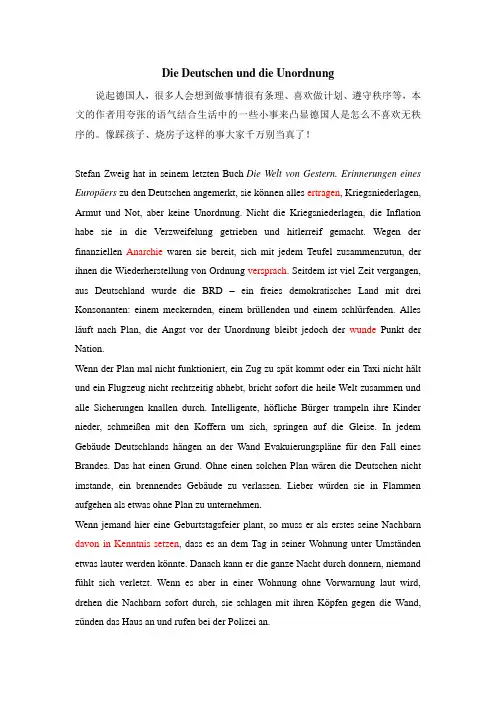
Die Deutschen und die Unordnung说起德国人,很多人会想到做事情很有条理、喜欢做计划、遵守秩序等,本文的作者用夸张的语气结合生活中的一些小事来凸显德国人是怎么不喜欢无秩序的。
像踩孩子、烧房子这样的事大家千万别当真了!Stefan Zweig hat in seinem letzten Buch Die Welt von Gestern. Erinnerungen eines Europäers zu den Deutschen angemerkt, sie können alles ertragen, Kriegsniederlagen, Armut und Not, aber keine Unordnung. Nicht die Kriegsniederlagen, die Inflation habe sie in die Verzweifelung getrieben und hitlerreif gemacht. Wegen der finanziellen Anarchie waren sie bereit, sich mit jedem Teufel zusammenzutun, der ihnen die Wiederherstellung von Ordnung versprach. Seitdem ist viel Zeit vergangen, aus Deutschland wurde die BRD –ein freies demokratisches Land mit drei Konsonanten: einem meckernden, einem brüllenden und einem schlürfenden. Alles läuft nach Plan, die Angst vor der Unordnung bleibt jedoch der wunde Punkt der Nation.Wenn der Plan mal nicht funktioniert, ein Zug zu spät kommt oder ein Taxi nicht hält und ein Flugzeug nicht rechtzeitig abhebt, bricht sofort die heile Welt zusammen und alle Sicherungen knallen durch. Intelligente, höfliche Bürger trampeln ihre Kinder nieder, schmeißen mit den Koffern um sich, springen auf die Gleise. In jedem Gebäude Deutschlands hängen an der Wand Evakuierungspläne für den Fall eines Brandes. Das hat einen Grund. Ohne einen solchen Plan wären die Deutschen nicht imstande, ein brennendes Gebäude zu verlassen. Lieber würden sie in Flammen aufgehen als etwas ohne Plan zu unternehmen.Wenn jemand hier eine Geburtstagsfeier plant, so muss er als erstes seine Nachbarn davon in Kenntnis setzen, dass es an dem Tag in seiner Wohnung unter Umständen etwas lauter werden könnte. Danach kann er die ganze Nacht durch donnern, niemand fühlt sich verletzt. Wenn es aber in einer Wohnung ohne V orwarnung laut wird, drehen die Nachbarn sofort durch, sie schlagen mit ihren Köpfen gegen die Wand, zünden das Haus an und rufen bei der Polizei an.Gleich nach der Geburt wird hier die Frage der möglichen künstlichen Beatmung im Alter diskutiert, sowie die in Frage kommenden Pflegestufen für die Zukunft, weil ja jedes Kind früher oder später alt sein wird, d.h. wenn alles nach Plan läuft. Um hier alt zu werden muss es aber sehr viele Formulare ausfüllen, unzählige Versicherungen abschließen und Einverständniserklärungen erteilen. Sobald ein Mensch hier schreiben bzw. unterschreiben kann, wird er jeden Tag seines Lebens ausfüllen und unterschreiben, ausfüllen und unterschreiben, ausfüllen und unterschreiben... Mein Kind geht ins Gymnasium, ich gebe ihm täglich eine unterschriebene Einverständniserklärung mit. …Damit Ihr Kind Benutzer der Bibliothek werden kann, um die Fotos Ihres Kindes in der Wandzeitung abdrucken zu dürfen, um am Schwimmunterricht teilnehmen zu dürfen…“ – nur zu: ich unterschreibe alles. Gestern bestellte ich in einer Eckkneipe eine volkstümliche Speise, den Strammen Max, ein mit Eier und Schinken belegtes Brot. …Aber bitte mit einer Scheibe Brot statt zwei“, präzisierte ich. …Eine Scheibe statt zwei? Wie? Eine statt zwei?“ Der Kellner dachte heftig nach, ob und wie es möglich wäre, einen Strammen Max mit einer Scheibe statt mit zweien zu machen, es ging beim besten Willen nicht, nein, es war …eine gastronomische Sackgasse“. Etwas verstört schaute er mich an. Natürlich zog ich sofort meine Bestellung zurück, der stramme Max soll so bleiben wie er immer ist: mit zwei Scheiben Brot und zwei Spiegeleiern drauf.Na und? - wird mancher Leser vielleicht sagen, was ist so schlecht an der Liebe zur Ordnung? Warum soll nicht alles nach Plan laufen? Das eigentliche deutsche Drama besteht darin, dass es so gut wie nie nach Plan läuft. Das Leben steckt voller Überraschungen, auch Mutter Natur handelt ungenau, der Wind weht mal von rechts und mal von links, die Sterne sind mal mehr und mal weniger am Himmel zu sehen und manchmal geht die Sonne später bzw. früher auf als erwartet, trotz der Zeitumstellung. Selbst wenn man jeden Tag zwei Mal eine Straβe fegt, bleibt immer irgendwo Müll liegen, irgendwelche Hunde laufen immer ohne Leine herum, und es gibt immer Menschen, die sich auf frisch gestrichene Bänke setzen, weil es ihnen Spaß macht.注释:ertragen V.t.忍耐,忍受Anarchie f.–n 混乱,无秩序versprechen V.i. 承诺,许诺wund Adj.擦伤的,创伤的;受伤害的,受创伤的jmdn. von etw. in Kenntnis setzen 告知某人某事zurückziehen V.t. 收回,撤回,取消Zeitumstellung f. –en 时间调整(为了节约能源,德国采用夏令时和冬令时制度。
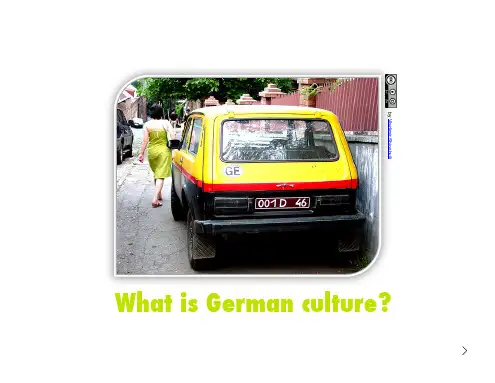

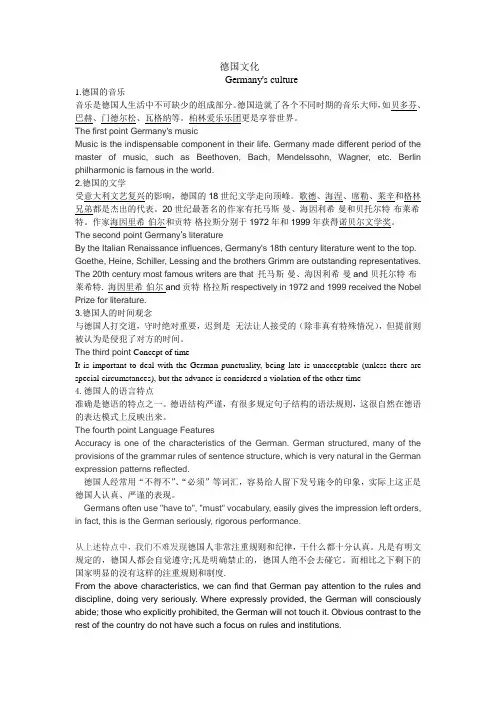
德国文化Germany's culture1.德国的音乐Music is the indispensable component in their life. Germany made different period of the master of music, such as Beethoven, Bach, Mendelssohn, Wagner, etc. BerlinBy the Italian Renaissance influences, Germany's 18th century literature went to the top. Goethe, Heine, Schiller, Lessing and the brothers Grimm are outstanding representatives. The 20th century most famous writers are that 托马斯·曼、海因利希·曼and贝托尔特·布莱希特.海因里希·伯尔and贡特·格拉斯respectively in 1972 and 1999 received the Nobel Prize for literature.3.德国人的时间观念与德国人打交道,守时绝对重要,迟到是无法让人接受的(除非真有特殊情况),但提前则被认为是侵犯了对方的时间。
The third point Concept of timeIt is important to deal with the German punctuality, being late is unacceptable (unless there are special circumstances), but the advance is considered a violation of the other time4.德国人的语言特点准确是德语的特点之一。



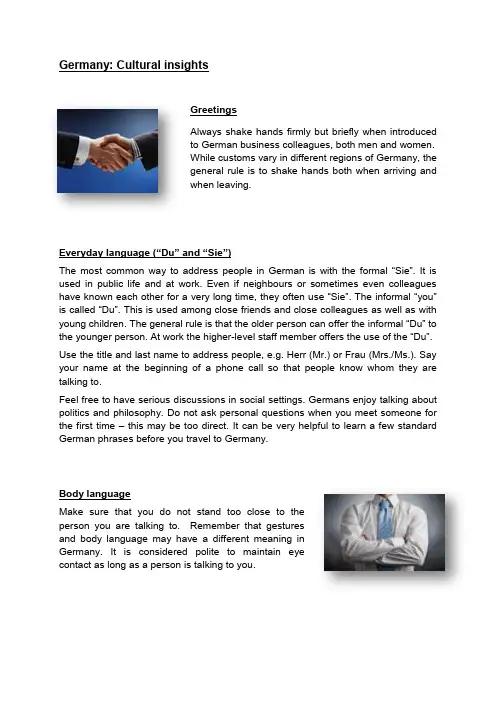
Germany: Cultural insightsGreetingsAlways shake hands firmly but briefly when introducedto German business colleagues, both men and women.While customs vary in different regions of Germany, thegeneral rule is to shake hands both when arriving andwhen leaving.Everyday language (“Du” and “Sie”)The most common way to address people in German is with the formal “Sie”. It is used in public life and at work. Even if neighbours or sometimes even colleagues have known each other for a very long time, they often use “Sie”. The informal “you” is called “Du”. This is used among close friends and close colleagues as well as with young children. The general rule is that the older person can offer the informal “Du” to the younger person. At work the higher-level staff member offers the use of the “Du”.Use the title and last name to address people, e.g. Herr (Mr.) or Frau (Mrs./Ms.). Say your name at the beginning of a phone call so that people know whom they are talking to.Feel free to have serious discussions in social settings. Germans enjoy talking about politics and philosophy. Do not ask personal questions when you meet someone for the first time – this may be too direct. It can be very helpful to learn a few standard German phrases before you travel to Germany.Body languageMake sure that you do not stand too close to theperson you are talking to. Remember that gesturesand body language may have a different meaning inGermany. It is considered polite to maintain eyecontact as long as a person is talking to you.PunctualityPunctuality is very important in Germany. Be on timefor every appointment, whether for business or socialengagements. It can be offensive to a German if youarrive too late, especially when you are in asubordinate position. Avoid skipping a scheduledbusiness meeting or cancelling it at the last moment.DiningBefore starting to eat, wait until someone (usuallythe host), or you yourself, says “Guten Appetit”.Try not to eat with your fingers except when eatingbread or biscuits.Placing one’s knife and fork side by side indicatesthat you are done with your meal. If you place themcrossed, it means you haven't finished with themeal.It is quite common to choose your own table in a restaurant (unless it is a very expensive restaurant or very full where you have to wait to be seated). In smaller, crowded cafes or bistro-type restaurants, it is possible to share a table with people you don’t know.In most German restaurants you have to order still or sparkling water and pay for it. It is not common to serve tap water. However, you may find restaurants which are willing to do so. When drinking beer or wine, people tend to raise or clink their glasses together and say “Prost” or “zum Wohl” and look each other in the eye when doing so.Polite gesturesIn Germany it is common to give a waiter or waitress atip of 5%-10%.If you are invited to a German home, remember totake a small gift for the host. When you bring a friendor colleague flowers, make sure not to give them redroses which symbolize love, or lilies which are usedfor funerals.SafetyThere are strict traffic rules in Germany, so do not jump a redtraffic light when driving. If a policeman sees you or you getcaught by a hidden camera, you will be fined. Try also not tocross the street when the pedestrian lights are red, especiallywhen there are small children at the crossing. Avoid walking orparking your car on the bike lane (it is marked red for areason).BusinessDo not be surprised when Germans knock on the table instead of applauding after a presentation or business meeting.Dress formally for business occasions.Good to knowMany restaurants don’t take cr edit cards.Shops, banks and chemists are normally closed onSundays in Germany. In big cities, supermarkets openearly and close at 8 or 10pm on weekdays and onSaturdays. Some of the smaller shops may close at 6 or7 pm. Department stores like “Kaufhof” are open from 9am until 8 pm.Banks have very specific opening hours which vary frombank to bank. Most banks are open until 6 pm onThursdays.Chemists are open on Saturdays only until 1 pm (max. 4pm). However, there are always one or two chemists open on Sundays and public holidays. You can ask your local chemist for a calendar which shows you the chemists you can contact in an emergency.If you are staying for a long period in Germany, become acquainted with the rules for garbage separation (paper, bottle and plastic banks).It is a constitutional right in Germany that nobody should be discriminated on the basis of gender, religion, class, sexual preference or race.Basic vocabularyApotheke。
德国文化Germany is a country with a rich and diverse cultural heritage that has produced some of the world's most renowned thinkers, artists, and innovators. The German culture is known for its passion for life, hospitality, and a strong sense of community.In terms of history, Germany has played a crucial role in European affairs for centuries. The country's rich history is reflected in its architecture, art, and music, which range from medieval cathedrals to modern artworks. Germany's cultural landscape is also enriched by the presence of various ethnic groups and traditions that have shaped the country's cultural identity.The German language, one of the most widely spoken languages in the world, is an integral part of German culture. The language is known for its precision, logic, and rich vocabulary, which have influenced many languages around the globe. Germans are also known for their love of music,especially classical music, and many renowned composers such as Bach, Beethoven, and Mozart have ties to Germany.Another important aspect of German culture is its hospitality and the kindness of its people. Germans value socializing and often gather for festivals, concerts, and other cultural events. The country's cuisine is also not to be missed, with dishes such as schnitzel, sauerkraut, and beer being some of the most famous German specialties.Finally, Germany is also known for its contributions to science and technology. The country has produced some of the greatest minds in these fields, including Albert Einstein, Max Planck, and many others. This has led to groundbreaking innovations in areas such as medicine, engineering, and renewable energy.In conclusion, the German culture is a rich and diverse tapestry that reflects the country's rich history, its people's hospitality and hardworking nature, and its contributions to science and technology. This culture has left a lasting mark on the world and continues to inspire people from all walks of life.翻译如下:德国是一个拥有丰富多元文化的国家,有着世界上享有盛名思想家、艺术家和发明家。
meat sausages, only have more than 1,500 varieties in, the dishes are not the same everywhere. Northern areas on seafood and poultry mainly known as dishes are:(plug filling halibut), (chestnut sauce halibut pills), (raisins sauce shuttle fish), (hot coals Baltic salmon) and (beat creamy red fruits dessert).There are some international known as the German dishes, for example:(flipping sandwich), (embalm ham) (meat muffin) And so on . Dessert is varied, such as black forest cherry cookies, etc.German attaches great importance to historical culture, that reveal on meal undoubted. But for tourists, seem to Germany dinner is not important, the important is beer and sausages. Mention Germany will easily reminiscent of pure beer. Indeed, German beer with phyletic is famous in the world, according to statistics, at least 4,000 different brand. Brewing beer highest principle is the pure, but in Germany for beer purity requirements for relatively strict laws and regulations, so that people trust. Even the same kind of beer will also because of different brands and have differentflavors. German another traditional cate is sausage.Germany's sausage use single material but can change a millions of the paragraph supplement, and quantity isdye-in-the-wood, call a person saliva unceasingly. Woodstripe of rye bread is rough shape of west simvastatin leahmain edible bread, match on Fried ham, taste wonderful, it belongs to a kind of special bread, for example, onion, sweet grapes and low caloric linb03 bread, containing sesame seeds, or sunflower seed bread has become more and more popular.The meal, German has many speciality, if have theopportunity to taste of words, must not be missed. Inaddition, there's history dishes - chivalric eat also quite attractive.By----Anna初二三班326。
Now l et’s have a glimpse of the great German culture.下面让我们来简单看看德国的文化。
In PaintingHans Holbein the Younger and Albrecht Dürer were important artists of the Renaissance, Caspar David Friedrich of Romanticism, and Max Ernst of Surrealism.著名的画家,比如文艺复兴时期的小汉斯·霍尔拜因和阿尔布雷希特·丢勒,还有浪漫主义时期的卡斯帕·大卫·弗里德里希,以及超现实主义的马克思·恩斯特。
Of MusicGerman music includes works by some of the world's most well-known classical music composers, including Ludwig van Beethoven, Johann Sebastian Bach, Johannes Brahms, and Richard Wagner.音乐方面,贝多芬、巴赫、勃拉姆斯、瓦格纳,都是世界最著名的作曲家。
Well-known German authors include Johann Wolfgang von Goethe and Friedrich Schiller. The collections of folk tales published by the Brothers Grimm popularized German folklore on an international level. Influential authors of the 20th century include Thomas Mann, Hermann Hesse, Heinrich Böll, and Günter Grass.歌德与席勒,著名的德国作家。
《德国文化》期末小论文Die Unterschiede zwischen Chinaund DeutschlandMit dem in den letzten Jahren immer enger werdenden wirtschaftlichen und kulturellen Austausch zwischen China und Deutschland nimmt auch das gegenseitige Verständnis zwischen Ost und West zu. Die mysteriöse östliche Fengshui-Kultur,Die komplizierten chinesischen Schriftzeichen faszinierten viele Deutsche, und der deutsche Bierfußball faszinierte auch viele Chinesen. Aufgrund der sehr unterschiedlichen historischen Traditionen und Lebensstile der beiden Seiten sind jedoch viele Bräuche und Gewohnheiten der beiden Länder sehr unterschiedlich. Viele seiner Verhaltensweisen waren auch überrascht不少外国人去中国溜达一圈之后跑回自己的国家出书介绍他们在中国经历的文化休克。
我觉得中国人最擅长的就是入乡随俗,即便不随俗他也能很快就做到见怪不怪,所以很少有中国人写外国的文化休克。
但是,仔细想想,中西毕竟还是有差别的。
1,德国人都不怕脏。
第一次来德国在法兰克福机场落地的时候,看见候机大厅里有个还不会走路的小孩在地上爬来爬去,出溜出溜地还挺快。
用介绍德国的风俗英语作文In Germany, there are various customs and traditions that are deeply rooted in the culture. Let me share with you some interesting aspects of German customs.When it comes to greetings, Germans often shake hands when they meet someone for the first time or in a formal setting. However, among close friends and family, they may opt for a hug or a kiss on the cheek. It is important to maintain eye contact while greeting someone, as it is a sign of respect and sincerity.Germans take punctuality very seriously. Being late, even by a few minutes, is considered impolite and disrespectful. Whether it's a business meeting or a social gathering, it is expected that everyone arrives on time. This reflects the German value of efficiency and respect for others' time.In Germany, it is common to bring a small gift wheninvited to someone's home. This could be a bottle of wine, flowers, or chocolates. It is seen as a gesture of appreciation for the invitation and shows good manners. Additionally, it is customary to remove your shoes when entering someone's house, especially if they have a carpet or wooden floors.Germans are known for their love of beer and the beer culture is deeply ingrained in their society. Beer gardens and beer festivals, such as Oktoberfest, are popular social gatherings where people come together to enjoy a cold beer and traditional German food. It is also common to toast before taking the first sip of beer, saying "Prost!" which means "Cheers!"Another interesting custom in Germany is the concept of "quiet Sundays." On Sundays, most shops are closed and people engage in quiet activities such as spending time with family, going for walks, or enjoying nature. It is considered rude to make loud noises or engage in activities that disturb the peace and tranquility of the day.When it comes to dining etiquette, Germans have certain customs to follow. It is polite to wait for everyone to be served before starting to eat. It is also customary to keep your hands on the table, resting your wrists on the edge. This shows that you are not hiding anything and are open and honest. Additionally, it is considered impolite to leave food on your plate, as it may imply that you did not enjoy the meal.These are just a few examples of the diverse customs and traditions in Germany. The country's rich cultural heritage and strong sense of etiquette make it afascinating place to explore and experience. So, if you ever find yourself in Germany, be sure to embrace and respect these customs to fully immerse yourself in thelocal culture.。